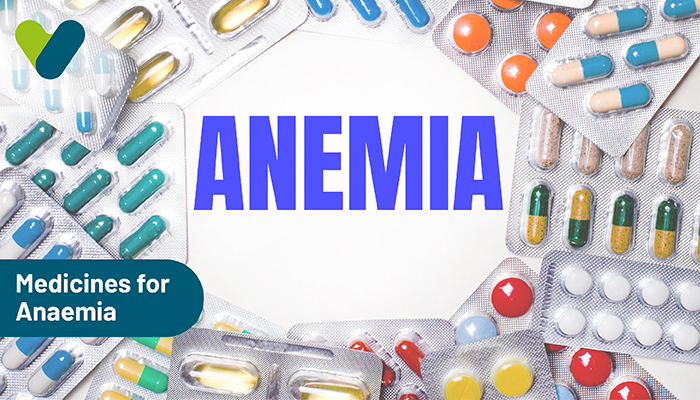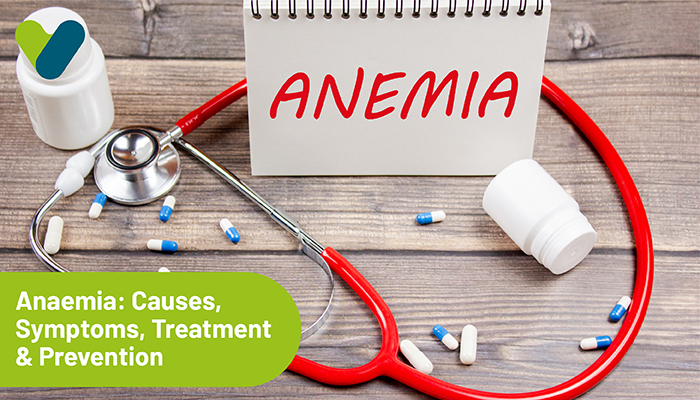Take a long, deep breath. Allow the oxygen-rich air to fill your lungs. Feeling refreshed? Doesn’t that deep breath relax your shoulders and neck? It also helps keep your blood oxygenated and your body working all the time. Anyone suffering from severe anaemia, where each breath does not provide enough oxygen, experiences weakness, dizziness, and inattentiveness.
Fortunately, if you are anaemic, you do not have to accept low levels of energy. There are numerous options available to help red blood cells (RBCs) and iron stores replenish, ranging from pills and treatment procedures to supplements.
Anaemia is a medical condition that occurs when your blood produces a smaller amount of RBCs, or haemoglobin, than normal. When you have anaemia, your body does not receive enough oxygen-rich blood. A low level of oxygen can leave you feeling tired and weak. You may also experience dizziness, shortness of breath, an irregular heartbeat, or headaches.
There are several types of anaemia; however, they are all caused by one of these three factors: blood loss, a reduced production of RBCs, or the destruction of red blood cells.
Following are among the most common types of anaemia:
Iron-deficiency anaemia results from low iron levels in the blood. The most common reason for this type is the loss of blood (which occurs commonly during heavy menstruation or due to bleeding caused by gastrointestinal tract conditions or an injury).
- Vitamin-deficiency anaemia is caused by a shortage of vitamin B12 or folic acid.
- Aplastic anaemia is a condition in which the bone marrow is unable to produce sufficient red blood cells.
- Haemolytic anaemia is a condition in which the body prematurely destroys red blood cells.
- Sickle cell anaemia is an inherited disorder characterised by abnormally shaped RBCs that are crescent-shaped.
- Thalassemia is an inherited condition in which an abnormal form of haemoglobin prematurely destroys the RBCs.
The severity and duration of anaemia differ. Because anaemia has an underlying cause, it is critical to receive prompt diagnosis and treatment.
Mild anaemia is a frequently occurring and easily treated condition that can affect anyone. It can happen suddenly or gradually, and it can be induced by your diet, medicines, or another medical issue. Anemia can also be chronic, which means it has a prolonged duration and may never completely disappear. Some types of anaemia have a hereditary cause. Iron-deficiency anaemia is the most commonly occurring type of anaemia.
Anaemia is highly prevalent in certain people, including pregnant women and females during their menstrual cycles. Individuals who do not consume sufficient iron or certain vitamins as well as people who take certain medications or treatments, are at a high risk of developing anaemia.
Anemia can also be a symptom of a serious medical condition, such as stomach bleeding, infection-related inflammation, kidney problems, autoimmune diseases, or cancer. Your doctor will diagnose anaemia after reviewing your medical history, physical examination, and test results.
Treatment options for anaemia
Treatments for anaemia vary depending on the type and severity of the condition. A few types of mild to moderate anaemia may require iron supplementation, vitamin supplements, or iron tablets for anaemia that stimulate your body's production of RBCs. Your doctor may also recommend healthy eating changes to help you prevent anaemia in the future. Severe cases or anaemia caused by an underlying condition, on the other hand, may necessitate additional procedures such as a bone marrow transplant or a blood transfusion.
Blood transfusions are an effective and common course used to treat various types of anaemia, including haemolytic anaemia, aplastic anaemia, sickle cell disease, and inherited anaemias like thalassemia. Transfusions can restore the lost blood or elevate the number of RBCs in the blood, making them an effective treatment option for a variety of conditions. Blood transfusions can occasionally cause a side effect of an allergic reaction or a bloodborne infection, but these are rare occurrences.
Your doctor may also advise you to take certain medications to boost your RBC production or reduce the iron overload caused by multiple transfusions.
Medicine for Anaemia
Erythropoiesis-stimulating agents (ESAs): Erythropoietin (EPO), a hormone secreted by the kidneys, aids in enhancing RBC production, which in turn promotes the synthesis of haemoglobin, thereby enabling the cells to transport oxygen all over the body. Anemia is caused by a deficiency of erythropoietin, and erythropoietin-stimulating drugs, such as Epogen and Procrit, can assist the body in producing more essential RBCs. These medications are efficacious for various types of anaemia cases; however, they can cause headaches, hypertension, nausea, body aches, and vomiting.
Vitamin B supplements: Vitamin-deficiency anaemia frequently necessitates the use of vitamin B12 or folate (vitamin B9) supplements, both of which are easily obtained over-the-counter medicines at drugstores and health food stores. They enable your body to restore normal blood cell production by replenishing vitamin levels. Some anaemia patients need a short course of supplements, whereas others may need them for the rest of their lives. It depends on the cause and severity of anaemia. Although side effects are uncommon, they can include dizziness, headaches, nausea, and vomiting.
Ferrous sulphate (iron supplements): These supplements restore your body's iron stores, allowing it to continue producing sufficient levels of RBCs and haemoglobin. An adult male body stores 1,000 mg of iron, while an adult female body stores 300 mg of iron, according to UCSF Health. Usually, iron should be obtained from a well-balanced diet; however, blood loss from an acute injury, menstruation, or gastrointestinal bleeding can deplete these stores rapidly. Iron supplements such as Feosol and Slow FE can help with this. To achieve maximum effectiveness, these supplements should be consumed on an empty stomach or with vitamin C from orange juice. Compared with other vitamins and minerals, iron overdose is possible; thus, you should always follow your doctor's advice and dosage guidelines.
What is the best anaemia medication: Anaemia is a complicated condition with no single cure. Instead, doctors and haematologists formulate a customised plan for each patient based on their type and severity of anaemia, age, medications, and history. With that in mind, here are some common medications that can assist in its treatment.
Name of the medication
Route of administration
Drug class
Ferrous sulphate (Feosol or Slow Fe)
Oral
Iron supplement
Folic acid
Oral or injection
Folate supplement
Vitamin B12
Oral or injection
B12 supplement
Folic acid + vitamin 12 (Foltrate)
Oral
Folate and B12 supplements
Procrit, Epogen, or Mircera (methoxy polyethylene glycol-epoetin beta)
Injection
Erythropoiesis-stimulating agents
This is not an exhaustive list; your dosage will be determined by your doctor based on your health, treatment response, age, and weight. There may be other possible side effects of these medicines.
Possible common side effects of the anaemia medications
Following are some of the more frequently occurring side effects, but these by no means make a complete list. Before starting any medication or other treatment, talk to your doctor about any potential side effects or drug interactions.
Iron supplements can cause constipation and upset stomach; therefore, it is essential to use a stool softener such as MiraLAX on a regular basis along with your iron pills. These medications are also capable of causing vomiting, nausea, and heartburn. Taking an antacid or milk of magnesia with iron pills may help.
Vitamin B12 supplements can also cause nausea and vomiting as well as headaches and light-headedness, while folic acid supplements can cause bloating, nausea, difficulty sleeping, and a loss of appetite.
Patients with anaemia who need an erythropoiesis-stimulating agent such as Epogen, Procrit, or Aranesp may encounter body aches, headaches, nausea, and vomiting.
Most effective home remedies for anaemia
A balanced diet is essential. People are frequently blown away by the huge impact that changes in diet might have on their lives. Sometimes, making simple dietary changes is all that is required to treat anaemia, especially in cases with mild vitamin deficiencies. If you are suffering from iron-deficiency anaemia, you should supplement your diet with iron-rich foods such as:
- Meat, especially red meats
- Dark green leafy vegetables
- Eggs
- Products made from soy
- Legumes
- Fish
- Broccoli
People who are deficient in vitamin B-12 should include the following foods in their diet:
- Greek yoghurt
- Fish
- Liver
- Eggs
- Milk
Good choices for increased folate levels include the following:
- Green, leafy vegetables
- Citrus fruits and juices
- Beans
- Whole grains
- Seafood
- Peanuts
A well-balanced diet rich in most of the aforementioned foods is an excellent way to not only prevent anaemia but also keep up overall health. Although supplements are beneficial, it is preferable to receive vitamins and iron from a natural diet.


